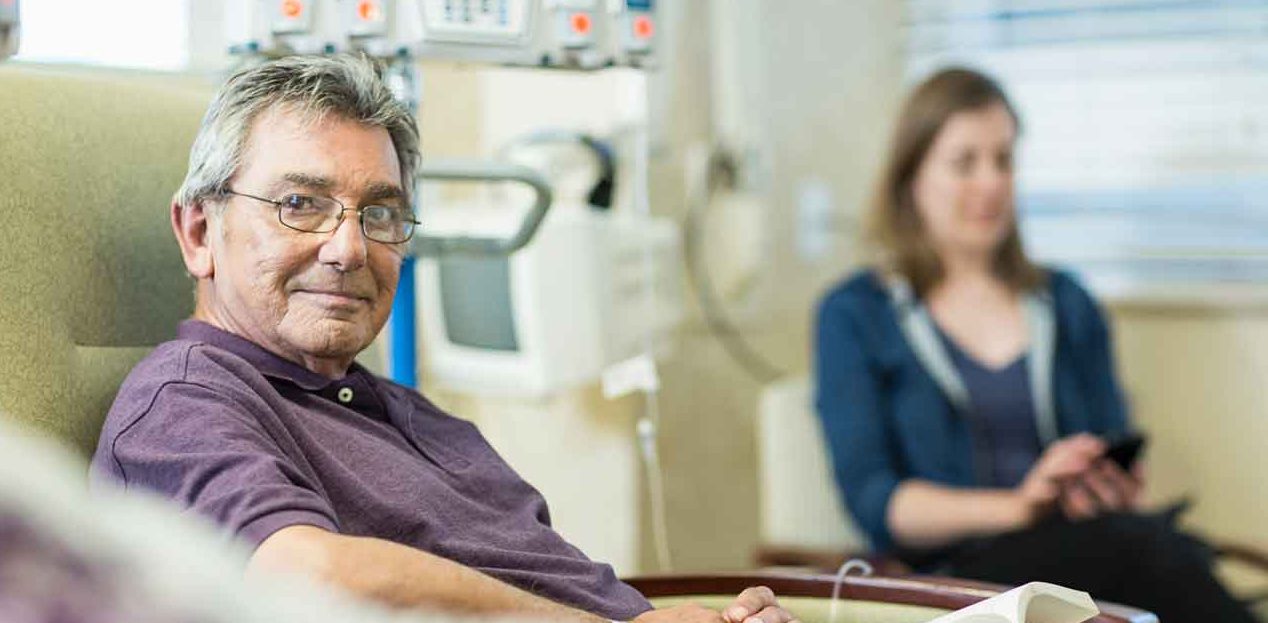Caring for Someone with Colon Cancer

Your right mindset, which includes meeting your own needs and asking others to help your loved one, will be good for both of you.
Ellen’s husband died of colon cancer at 50, but she’s never had a colonoscopy — a surgical scope checking the inside of your colon for growths. She just couldn’t face it, she says.
That’s a bad idea. A colonoscopy can save your life: 90 percent of patients with cancers discovered when they were still in the colon or rectum are alive five years later. But if the cancer is discovered later, after it has spread to other organs, the chances of living that long drops to 12 percent.
YOU MIGHT ALSO LIKE: Colon Cancer Survivor: “Don’t Avoid a Colonoscopy”
Colon cancer is the second leading cause of cancer deaths in the United States (after lung cancer) but, because it involves the large intestine (and bathroom activities), it’s not a disease people discuss. The colon is another name for the large intestine, the organ where food arrives after passing through the stomach and small intestine, before waste leaves the body through the rectum and then your anus, also known politely as your rear. “Colorectal cancer” includes cancers of the colon and rectum.
Cancers in the colon usually begin as benign polyps, which may cause constipation or blood in the stool but often produce no symptoms at all. Some polyps become cancerous, or malignant, which means they’ll keep growing and spread to other parts of the body.
We tend to get more polyps past the age of 50, so that’s when someone with a standard risk of colon cancer should get the first colonoscopy. When gastroenterologists find polyps during a colonoscopy, they usually remove them. Most people should get checked every decade after 50. But some people should get checked sooner or more often: A family history of colon cancer, obesity, smoking, or a diet with a lot of fat or alcohol are all risk factors. Exercising and eating lots of fiber can help prevent colon cancer and are a good idea for all kinds of reasons.
YOU MIGHT ALSO LIKE: The Young Aren’t Invincible against Colon Cancer
Often when family members get cancer we worry that we’ll get the same cancer, too. About a quarter of all colorectal cancer patients have a family history or genetic condition that makes the disease more likely. If your sibling, parent, or child has had a colon cancer, your risk doubles or triples. Speak to a genetic counsellor if you have a relative with a colon cancer that began under the age of 50, any family member with many colon polyps, or a member of the family who has had more than one kind of cancer.
If you notice any blood in your stool or experience a lasting change in your bowel habits, speak to a doctor — at any age. One in every 10 colon cancer patients is under the age of 50, and often these cancers are discovered late because people don’t suspect cancer.
As a caregiver, it’s important to notice if you’ve adopted attitudes that will make you more likely to burn out.
Some people unconsciously give in order to get. Do you feel you have to prove that you are worthy of your loved one’s affection? Do you berate yourself, thinking, “I never do anything right”? Do you think that if you do things right, you’ll get the love, attention, and respect you crave? Your loved one may not be in a position to meet your needs, however grateful she feels. But you can and should look for ways to meet them.
Some people take the whole world on their shoulders as if no one else existed. Do you think you are being selfish if you put your own needs first? Is it frightening to think of your own needs? Do you have trouble asking for what you need? Do you feel inadequate if you ask for help? Do you think you are responsible for your loved one’s health, or that if you don’t do a chore, no one else will step in?
Your actions will reflect your thoughts. The right mindset — which includes the recognition that you need to meet your own needs and that others can help your loved one — will be good for both of you.
YOU MIGHT ALSO LIKE: African Diet Cuts Your Colon Cancer Risk
Resources for colon cancer
- Colon Cancer Coalition offers grants and an online community for colon cancer patients and caregivers.
- The Colon Club provides an online forum and organizes unusual projects to raise colon cancer awareness.
- Fight Colorectal Cancer provides message boards and personalized reports from a colorectal cancer specialist to discuss with a patient’s doctors.
- Michael’s Mission offers an “Ask An Expert” feature and detailed advice for caregivers.
- American College of Gastroenterology offers online brochures and physician podcasts.
Resources for all cancers
- CancerCare offers financial assistance and free face-to-face, telephone, and online support groups led by professional oncology social workers. You can also get telephone and in-person counselling as a caregiver or cancer patient.
- CancerSupportCommunity provides a helpline (1-888-793-9355) as well as online chat support and online, professionally led support groups for caregivers and patients.
- American Cancer Society trains cancer survivors to volunteer as support people face to face or by phone.
- Imerman Angels (1-877-274-5529) partners a person fighting cancer with someone who has beaten the same type of cancer.
- Cancer Hope Network (1-877-467-3638) also matches cancer patients to a survivor with a similar kind of cancer.
- The Scott Hamilton CARES Initiative - 4th Angel Program (1-866-520-3197) matches cancer patients and caregivers with a coach, working by phone or email.
Resources for all caregivers
Updated:
March 30, 2020
Reviewed By:
Janet O’Dell, RN